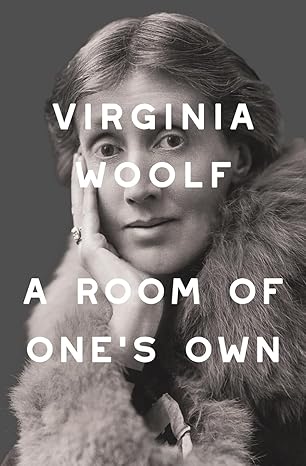A Room of One's Own

Author: Woolf, Virginia
Tags: edifying, side-quest
Timeline: between Thursday, August 21, 2025 and Thursday, September 4, 2025
“We are all going to heaven and Vandyck is of the company – in other words, how good life seemed, how sweet its rewards, how trivial this grudge or that grievance, how admirable friendship and the society of one’s kind, as, lighting a good cigarette, one sank among the cushions in the window-seat.”
The author’s 1929 essay where she was asked (we are told) to comment on women and fiction. And her opinion, stated in the first couple of pages, is that in order to write (any book) a woman needs her own room and 500 pounds a year. (I asked OpenAI what that equates to in 2025 dollars and got an answer of $56,000 however that seems low given that she assumes it seems a fairly high standard of living. I would say $200,000 is a better guess – end digression) She hand waves, which is to say refuses to give opinions on the questions of what kind and what quality of books women might write and the qualities of females in general. She also warns that when she provides names, dates and places it will be strictly fictional; the rest of the 172 pages contain the author’s rambling, peripatetic, indeed, brook-like, flow of thoughts as she justifies her conclusions.
I am very happy with using a metaphorical brook to describe her prose; I have fond memories of summer backpacking trips that followed creeks, brooks or streams and the sensation of falling asleep to the sound of rushing water. Likewise, I found the journey of this essay with few exceptions to be very pleasant as long as I was paying attention (context switching in the prose can be subtle). This is my first book from Woolf and I hope that though it be non-fiction this introduction to her writing style will prepare me to tackle fiction from the “Most important progenitor of stream of consciousness”.
Other take-aways:
-
I honestly have a hard time with distinguishing female compared to male prose apart from obvious cues of subject matter (e.g. gratuitous violence, misogeny) and Woolf describes various authors having gender-neutral prose (Shakespeare for example). But then again I am a guy so I swim in the patriarchy…
-
She spends a great deal of verbiage making clear the various, quite stringent, legal and societal obstacles to publishing anything written by a woman up to about 1800 and the gradual relaxation of those restrictions until women received the vote in the decade prior to the essay. And yet, even up until the 1960s in the USA women could not get a mortgage in order to purchase a house. And now we have “tradwives” who are attempting to reverse the pendulum of freedom for females.
-
And, of course, I have not read many of Woolf’s (especially anglocentric) literary touchstones.